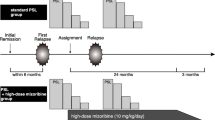Abstract
Relapses of steroid-sensitive nephrotic syndrome are traditionally treated with prednisone 2 mg/kg/day or 60 mg/m2/day. Retrospective data support the use of lower doses. We designed a prospective randomized pilot study to investigate the efficacy of different doses in achieving remission of steroid sensitive nephrotic syndrome relapse. The cohort included 30 children with relapsed steroid sensitive nephrotic syndrome, mean age 6.3 ± 3 years and mean disease duration 2.2 ± 1.8 years. The children were randomized to receive 2, 1.5, or 1 mg/kg/day prednisone. The corresponding times to response, defined as the first of 3 consecutive days without proteinuria, were 7.2 ± 1.4, 10.2 ± 5.1, and 9 ± 3.3 days; the difference between the 1.5 and 2 mg/kg/day groups was statistically significant. One patient each in the 1 mg/kg/day and the 1.5 mg/kg/day groups failed to respond and were switched to 2 mg/kg/day, leading to a response after 3 and 10 days, respectively. Mean cumulative prednisone doses in the 3 groups were 45.5 ± 3.4, 42.7 ± 25.9, and 24.9 ± 7.4 mg/kg, respectively (P < 0.05).
Conclusion: In the present study, treatment of childhood steroid sensitive nephrotic syndrome relapse with prednisone 1–1.5 mg/kg/day led to a significantly lower cumulative dose than the standard dose. Treatment with a lower dose may be equally safe and effective to the standard dose.
What is Known: | |
• Relapses of steroid-sensitive nephrotic syndrome are traditionally treated with standard-dose steroids. | |
• Treatment with corticosteroids may have significant adverse effects mainly with long-term use. | |
What is New: | |
• Treatment of steroid sensitive nephrotic syndrome relapse with 1–1.5 mg/kg/day prednisone may lead to a significantly lower cumulative dose. | |
• Treatment with a lower steroid dose may be as effective as the standard dose in achieving remission of steroid sensitive nephrotic syndrome relapse. |

Similar content being viewed by others
Abbreviations
- SNSS:
-
steroid-sensitive nephrotic syndrome
References
Buchman AL (2001) Side effects of corticosteroid therapy. J Clin Gastroenterol 33:289–294
Deschênes G, Vivarelli M, Peruzzi L, ESPN Working Group on Idiopathic Nephrotic Syndrome (2017) Variability of diagnostic criteria and treatment of idiopathic nephrotic syndrome across European countries. Eur J Pediatr 176:647–654. https://doi.org/10.1007/s00431-017-2891-2892
Eddy AA, Symons JM (2003) Nephrotic syndrome in childhood. Lancet 362:629–639
Gipson DS, Massengill SF, Yao L, Nagaraj S, Smoyer WE, Mahan JD, Wigfall D, Miles P, Powell L, Lin JJ, Trachtman H, Greenbaum LA (2009) Management of childhood onset nephrotic syndrome. Pediatrics 124:747–757. https://doi.org/10.1542/peds.2008-1559
Lombel RM, Gipson DS, Hodson EM, Kidney Disease: Improving Global Outcomes (2013) Treatment of steroid-sensitive nephrotic syndrome: new guidelines from KDIGO. Pediatr Nephrol 28:415–426. https://doi.org/10.1007/s00467-012-2310-x
Mehls O, Hoyer PF (2011) Dosing of glucocorticosteroids in nephrotic syndrome. Pediatr Nephrol 26:2095–2098. https://doi.org/10.1007/s00467-011-1993-8
Mishra OP, Basu B, Upadhyay SK, Prasad R, Schaefer F (2010) Behavioural abnormalities in children with nephrotic syndrome. Nephrol Dial Transplant 25:2537–2541. https://doi.org/10.1093/ndt/gfq097
Pasini A, Aceto G, Ammenti A, NefroKid Study Group et al (2015) Best practice guidelines for idiopathic nephrotic syndrome: recommendations versus reality. Pediatr Nephrol 30:91–101. https://doi.org/10.1007/s00467-014-2903-7
Raja K, Parikh A, Webb H, Hothi D (2017) Use of a low-dose prednisolone regimen to treat a relapse of steroid-sensitive nephrotic syndrome in children. Pediatr Nephrol 32:99–105
Raman V, Krishnamurthy S, Harichandrakumar KT (2016) Body weight-based prednisolone versus body surface area-based prednisolone regimen for induction of remission in children with nephrotic syndrome: a randomized, open-label, equivalence clinical trial. Pediatr Nephrol 31:595–604. https://doi.org/10.1007/s00467-015-3285-1
Samuel S, Morgan CJ, Bitzan M, Mammen C, Dart AB, Manns BJ, Alexander RT, Erickson RL, Grisaru S, Wade AW, Blydt-Hansen T, Feber J, Arora S, Licht C, Zappitelli M (2013) Substantial practice variation exists in the management of childhood nephrotic syndrome. Pediatr Nephrol 28:2289–2298. https://doi.org/10.1007/s00467-013-2546-0
Tarshis P, Tobin JN, Bernstein J, Edelman CM Jr (1997) Prognostic significance of the early course of minimal change nephrotic syndrome: report of the international study of kidney disease in children. J Am Soc Nephrol 8:769–776
Author information
Authors and Affiliations
Contributions
Yael Borovitz—designed the research, patient, and data collection and planned the statistical analysis; participated in enrollment, investigation, data collection, and analysis; and drafted and revised the manuscript.
Hadas Alfandary—participated in patient enrollment and investigation, data collection, and revised the manuscript.
Orly Haskin—participated in patient enrollment and investigation, data collection, and revised the manuscrip
Shelly Levi—participated in patient enrollment and investigation, data collection, revised the manuscript.
Shulamit Kaz—participated in patient enrollment and investigation, data collection, and revised the manuscript.
Miriam Davidovits—designed the research, monitored data collection, participated in the investigation and data collection, and revised the manuscript.
Amit Dagan—designed the research, patient, and data collection; planned the statistical analysis; participated in enrollment, investigation, data collection, and analysis; drafted and revised the manuscript.
Corresponding author
Ethics declarations
Conflict of interest
The authors declare that they have no conflict of interest.
Ethical approval
All procedures performed in studies involving human participants were in accordance with the ethical standards of the institutional and/or national research committee and with the 1964 Helsinki declaration and its later amendments or comparable ethical standards.
Informed consent
Informed consent was obtained from all parents or guardians of the study participants.
Additional information
Communicated by Mario Bianchetti
Publisher’s note
Springer Nature remains neutral with regard to jurisdictional claims in published maps and institutional affiliations.
Rights and permissions
About this article
Cite this article
Borovitz, Y., Alfandary, H., Haskin, O. et al. Lower prednisone dosing for steroid-sensitive nephrotic syndrome relapse: a prospective randomized pilot study. Eur J Pediatr 179, 279–283 (2020). https://doi.org/10.1007/s00431-019-03506-5
Received:
Revised:
Accepted:
Published:
Issue Date:
DOI: https://doi.org/10.1007/s00431-019-03506-5




